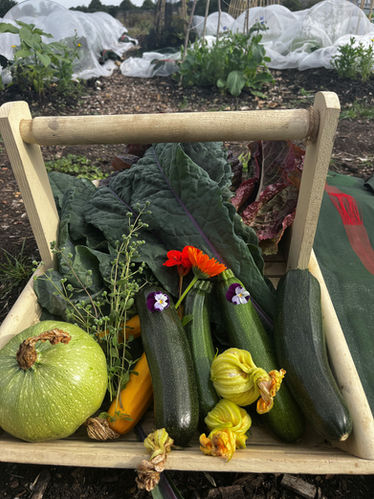FWAG's GREAT Market Garden Project
We are an agroecological market garden and teaching space based in Cirencester, Gloucestershire.
As well as helping to grow sustainable food our project is also growing knowledge and skills in agroecology by working closely with the Royal Agricultural University in Cirencester (RAU).
The GREAT Market Garden project, led by the Farming and Wildlife Advisory Group Southwest, in partnership with the RAU, has commenced a bold project to showcase agroecological growing. The market garden supplies a wide range of sustainable salad and vegetables to the RAU kitchen, staff, students and the wider community, as well as local farm shops, commercial cafes and restaurants and pioneering 'pay as you can' social enterprises.
‘We are delighted to be able to support the RAU in helping the next generation of farmers learn how to grow food with nature,’
Jenny Phelps MBE.
Previously a conventional arable field, the 7.5 ha site has been converted to horticulture alongside experimental plots using the Zerodig method. Zerodig is a step-by-step no-dig method, developed by Christopher Upton and Dr Mario Peters, which prioritises climate action, ecosystem restoration, and healthy local food production.
It uses compost, manure and woodchip to build fertility in the soil.

Updates


Produce
Fresh, healthy and sustainable produce is sold to local people and businesses.
Food equity is a core principle driving the GREAT Market Garden Project. The project focuses on forming supportive relationships with the local community, donating fresh produce to local community food providers, social enterprises and supporting the work of the Cotswold Food Network.
Research
Agroecological research underpins the design of our project.
As part of our project we assessed agroecological learning across the RAU curriculum.
Experimental plots and land-use change can serve as fuel for dissertation research questions and data collection.
Partnerships are being developed with farmers and researchers to explore sustainable land management.

Learning
Over 1000 students and visitors explore our site each year through field sessions, courses, volunteering, talks and events.
Biodiversity features include beetle banks and wildflower strips to attract diverse wildlife, as well as seed saving, making the site an agroecological oasis and contributing to integrated pest management.
Our Produce
How to purchase our veggies
The GREAT Market Garden supplies a variety of customers, including the RAU, local cafes, pubs and restaurants with high quality produce, including heritage tomatoes, salads, kale, agretti and squashes.
A weekly supply
of vegetables is also available for purchase directly by individuals in the community.
To join our Veg Community use this link
https://chat.whatsapp.com/L8ZcXUYbIt75QXtgGidhdA
Alternatively contact us at greatmarketgarden@gmail.com for more information.
.png)
Home-Grown Veg to RAU's Catering Service
Our head growers have been diligently working with the catering team to align the vegetable production with the requirements of the RAU kitchen. By understanding the current food usage, we ensure that the produce is grown to meet the team's specific requirements, resulting in fresh and delicious vegetables ready for consumption.
Why choose our vegetables
The vegetables grown at the GREAT Market Garden are cultivated agroecologically.
We enhance soil health using the 'zerodig' model and use companion cropping, planting of resistant varieties, seed saving and the promotion of natural protection against unwanted pests. Our fertility-building methods provides the best environment for beneficial soil microbiota to thrive, contributing to the overall health of our produce.

Tell your visitors your story. Add catchy text to describe what you do, and what you have to offer. The right words can inspire and intrigue your audience, so they’re ready to take action on your site. To start telling your story, double click or click Edit Text.
Rachel Wheatley
Co-Head Grower
Rachel, a University of Oxford graduate, has 30 years of expertise in vegetable cultivation, ranging from organic olive oil production in Italy's Sabina region to designing city gardens and managing market-scale operations.
Rachel worked with Zerodig Earth on a wide range of market garden projects and lead field trials on the nutrient density of different varieties of kale.
Rachel has been developing the GREAT Market Garden project at the RAU since 2023, growing agroecological salds and veg, pioneering new crops, and working closely with the FWAG SW Project Team and RAU academics, staff and students.
"We really want to create a practical space for research and learning about healthy soils and nutrient density"
Alex Middleton
Co-Head Grower
Alex joined the Great Market Garden team in 2025. He has extensive experience in a range of commercial growing roles, as well as having worked as a chef and an artist.
Alex's aim is to develop the project's commercial veg sales to local food businesses and the community to ensure the project is a fully sustainable enterpise


FWAG advisor Ed discussing the site plans with MSc Organic systems class on site.

Planted hedgerow placed on slope to protect the site from harsh winds in open area.

A new volunteer bench helps gives our volunteers a place to sit and to socialise...boosting health and wellbeing.

FWAG advisor Ed discussing the site plans with MSc Organic systems class on site.
How the GREAT market garden was developed




Highlights from 2025
Get Involved
Volunteering / Agroecology and Social Events
Volunteers can learn growing techniques from experienced growers in a nature-friendly manner. We will be hosting social events to celebrate our progress and create a community of like-minded people.
We have a Whatsapp group and you can find us on Instagram
Email greatprojectzerodig@gmail.com
or to find out what research opportunities are available on site.


Get Involved
Volunteering and Events
Interested in learning more about agroecological horticulture? Want to develop new skills? Or just get outdoors and meet new people? Then come along to one of our volunteering sessions and learn about nature-friendly growing techniques.
New Sessions Starting Spring 2026 - from Wednesday 4th Feb 1pm!
Join our WhatsApp group and follow us on Instagram to learn more.
Email: greatmarketgarden@gmail.com

































